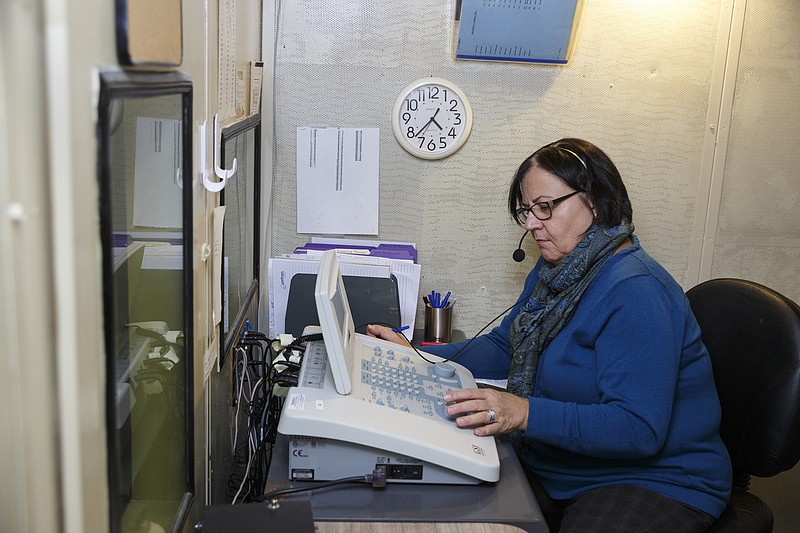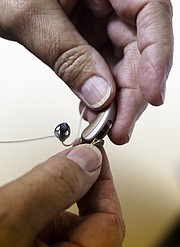The federal Food and Drug Administration is dropping some of its regulation of hearing aids in hopes that cheaper alternatives will soon be available. But the proposal is drawing opposition from audiologists, who say inexpensive devices won't help people with serious hearing loss.
The FDA recently announced it would stop enforcing its requirement that anyone buying a hearing aid get a medical checkup or sign a waiver declining the checkup beforehand. That won't have much impact on how hearing aids are currently sold, according to professionals in the field, because most people getting a hearing aid already waive the medical exam.
But the agency also said it is considering creating a new class of hearing aid devices that could be sold over-the-counter, at drug stores or even Wal-Mart, similar to the way some reading eyeglasses are now sold, with no need to see any expert.
"Consumers have been saying for a long time that getting lower-cost instruments is important to them," said Dr. Todd Ricketts, an audiologist at Vanderbilt University Medical Center who does research on hearing aids. "Addressing ways to bring down the cost, particularly to people with mild or moderate hearing loss, is important. There absolutely is an unmet need."
But audiologists, the professionals who currently provide most hearing aids, are wary that the government may be touting a simple answer to a problem that often is more complicated.
"You need to have somebody to look in your ear to see if there is a medical issue going on and that there is no wax accumulation," said Ursula Chaplin, an audiologist and executive director of the nonprofit Speech and Hearing Center in Chattanooga. "How are you going to self administer a hearing test? It is difficult to be accurate."
In a report last year, the President's Council of Advisors on Science and Technology estimated that 30 million Americans above age 60 suffer from hearing loss.
"Untreated hearing loss is statistically associated with higher risks of social isolation, depression, dementia, falls with injury and inability to work, travel, or be physically active," the report's authors said.
But "hearing aids have not experienced the dramatic reduction in price or increases in features and innovations as seen in other consumer electronics," they noted.
Instead, in recent years, the need for an inexpensive device to improve hearing has increasingly been met with new devices called Personal Amplification System Products (PASPs). PASPs are touted for their ability to help people with no actual hearing loss - but who just want to amplify the sound around them - hear better. They look like hearing aids and often make claims similar to those of hearing aid manufacturers, but there is also a warning on the packaging stating that they are consumer electronic devices and not hearing aids.
The personal amplification devices are becoming ever more popular in part because they are now adding features not available on many hearing aids, such as wireless connectivity to smartphones that allow them to be used to listen to music or answer telephone calls, or to use noise-canceling technology to block out background sounds.
Personal amplification devices range in price from $25 all the way up to several hundred dollars, but they are much less expensive then hearing aids.
Hearing aid prices average from $4,000 to $6,000 for a pair. Medicare does not pay for the devices nor do most private health insurance plans.
About half of that price is to pay for the professional examination, custom-fitting the devices to a patient's ears, and follow-up, Ricketts said. One recommendation of the PCAST report is that the process for obtaining a hearing aid be changed so that the professionals doing the examination be required to provide consumers with an audiogram describing their degree of hearing loss that could then be taken to any place that sells OTC hearing aids (CostCo, for example) to buy the device.
Hearing aids are medical devices, so the FDA regulates how they are made and requires they be proved effective. The personal amplification devices are not regulated, so there is no guarantee they work, said Dr. Steve Doettl, an audiologist at the University of Tennessee Health Science Center in Knoxville.
Using poorly designed PASPs to amplify sounds may actually harm your hearing, audiologist Ricketts said, just as occurs if you listen to music at high volume on headphones. Instead of PASPs, audiologists favor an over-the-counter hearing aid that must meet standards for safety and effectiveness, and includes warnings that certain hearing problems require professional treatment.
"PASPs look like a hearing aid and smell like a hearing aid, but we don't call them that," Doettl said. "Let's call it what it is - it is for the treatment of hearing loss - but have strict regulations on the device."
Some consumer advocates have insisted that an over-the-counter hearing aid would be similar to the over-the-counter eyeglasses available at almost every drugstore and grocery store. Audiologists, many of whom might see their business suffer if the OTC proposal is approved, dispute that analogy.
"It is easy to put on reading glasses, hold up a printed paper and say, 'Hey I can read just fine,'" Ricketts said. "Hearing loss and hearing aids aren't like that. My bias is that people aren't very good at doing that."
"Reader glasses are akin to turning up the radio a bit," Doettl said. "A hearing aid for people with hearing loss is not only an amplification issue. There is a resolution issue in their ears. There is a more specific and more difficult medical condition to treat than putting on a pair of glasses."
But there is support in Congress for allowing hearing aids to be sold over-the-counter. Republican U.S. Sen. Chuck Grassley, R-Iowa, and Democratic U.S. Sen. Elizabeth Warren, D-Mass., last month introduced the Over-the-Counter Hearing Aid Act of 2016, to require the FDA to establish rules and regulations for hearing aids that would be very similar to PASPs, but would have to meet certain safety and effectiveness standards.
"This won't affect those who need professional expertise to be fitted for hearing aids or have hearing aids implanted," Grassley said in a press release. "The over-the-counter option is for those who would benefit from a simpler device."
"In my opinion, that is a terrible thing," Chaplin said. "If you buy an inexpensive cheap hearing aid and expect to hear well with background noise, that is not going to happen," she said.
Even if hearing aids are cheaper, audiologists say many people may still avoid them, often because they are seen as a sign of age-related physical decline.
"About 30 percent of people with hearing loss pursue hearing aids," Vanderbilt's Ricketts said. "In countries where they give them away for free, it's only 40 percent, so cost isn't the only factor. There are people who feel like they don't have enough hearing loss to warrant the hassle."
"If you use the reading glass analogy, I'm someone who uses reading glasses, but I didn't until I could no longer read. There are people with hearing loss who say, 'I do OK,' and it has to get bad enough before they will go through the pursuit of amplification."
Contact staff writer Steve Johnson at 423-757-6673, sjohnson@timesfreepress.com, on Twitter @stevejohnsonTFP, and on Facebook, www.facebook.com/noogahealth.

